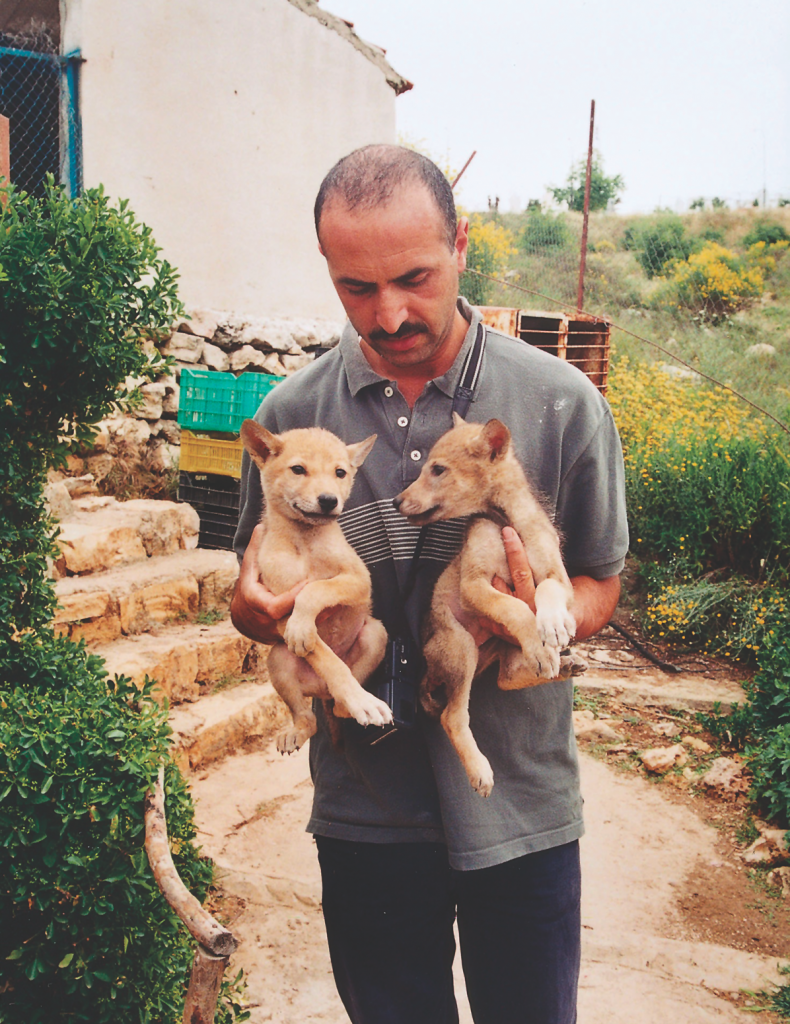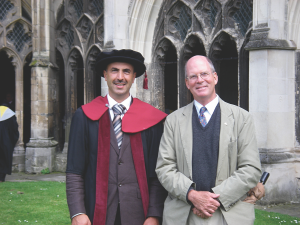Through QLF, Mounir established his first association with the conservation world beyond Lebanon. Over the years, he has drawn extensively upon his experiences with QLF in his work. In Mounir’s words: “QLF planted the tree, and the tree is growing now.”
UPDATE: April 15, 2020
Mounir recently appeared on Lebanon with a Twist, an online program aimed at promoting sustainable eco-tourism in Lebanon. In the video linked below, Mounir discusses in Arabic about the importance of bats in their ecosystems and how they are not responsible for the COVID-19 pandemic: https://www.facebook.com/LebanonWithaTwist/videos/650810929086075/
Mounir’s work with the hyenas of Lebanon was featured in The New York Times. Please click on the link below to find out about his important work in the region: https://www.nytimes.com/2019/10/30/science/striped-hyena-lebanon.html?searchResultPosition=1
QLF Experiences
Middle East Exchange Program, New England, 1995
Middle East Regional Meeting, Cyprus, 2001
Middle East Regional Meeting, Turkey, 2008
Middle East Program Regional Meeting, Oman, 2012
QLF Alumni Congress, Budapest, Hungary 2006
QLF Alumni Congress, Barcelona, Catalonia, Spain 2016

Mounir Abi Said with wolf pups at Animal Encounter, an environmental education center in Aley, Lebanon, east of Beirut. PHOTOGRAPH BY LARRY MORRIS
Mounir earned both his undergraduate degree in Agriculture and his Master’s in Animal Sciences at the American University of Beirut. Shortly after completing his master’s degree and establishing Animal Encounter, Mounir joined QLF’s Middle East Environmental Education Fellowship Program in 1995, traveling throughout New England to learn about various environmental education and awareness techniques. Mounir recalls visiting the Squam Lakes Natural Science Center during the fellowship, which had a wildlife division with similar objectives to that of Animal Encounter. Mounir learned from the center’s model, returning to Animal Encounter with new ideas concerning how to enrich the animals’ lives, develop more hands-on activities, and increase visitor capacity. Mounir pursued fieldwork involving ecological monitoring, as well as advocated for biodiversity protection laws on the National Council for Hunting and the Ministry of Environment. This experience exposed him to diverse legislative challenges regarding the protection of wildlife from urbanization, deforestation, and poor hunting practices.
Dr. Mounir Abi-Said’s unabating passion for wildlife influenced both his studies and his career path, as well as his decision to establish an NGO with his wife Diana, named Animal Encounter: Educational Center for Wildlife Conservation. In the last decade, illegal animal trade in the black market posed a severe threat to Lebanese wildlife, which increased Mounir’s concern for the country’s dwindling biodiversity and inspired him to act. Since founding Animal Encounter in 1993 with the help of another organization, Green Line Association, Mounir and Diana have expanded the center from their backyard to a larger parcel of land in Ras-El-Jabal, Lebanon. Animal Encounter was established to promote environmental awareness through educational programs, to explore the indigenous fauna and flora of Lebanon, and to rehabilitate any injured wildlife. In terms of educational activities, Mounir and Diana organize seminars and guided tours, highlighting the personal stories, ecosystem roles, and preservation importance of various animals. Animal Encounter also hosts conservation-themed holiday events for International Bat Night, Halloween, and Easter.
Originally, Mounir purchased animals directly from the black market to rescue them from captivity. However, he soon realized that such an effort to free animals continued to pour revenue into the illegal animal trade; thus, rescuing animals directly from life-threatening situations in the wild constituted a more sustainable solution. Each year at Animal Encounter, Mounir and Diana rescue around two hundred birds and seventy mammals native to Lebanon. On average, thirty percent return to the wild, while some remain at the center. Hyenas, badgers, jackals, and foxes are common rescues, while the birds of prey that they aid include buzzards, eagles, storks, and pelicans. In addition to providing such wildlife with a safe home for recuperation, Mounir and Diana sometimes breed species to increase their population numbers.

Mounir Abi-Said and QLF President Emeritus Larry Morris standing in front of Canterbury Cathedral, England, 2007. Mounir received his doctoral degree in Wildlife Conservation from the University of Kent based on his research on the Striped Hyena (Hyaena hyaena). PHOTOGRAPH BY DIANA ABI-SAID
Once Animal Encounter was firmly established in 2006, Mounir received his Ph.D. in Biodiversity Management at the University of Kent in Canterbury, U.K., with a focus on the mammalogy of carnivores. He cites QLF as one of the main proponents of his decision to pursue graduate work: “The QLF Fellowship in 1995 broadened my knowledge of wildlife conservation, and that has, in part, motivated my decision to pursue my Ph.D.” Mounir has since taught courses on conservation and mammalogy at the Lebanese University, and has conducted research at the American University of Beirut. His coursework and research encompass a broad range of topics, spanning from ecology and animal behavior to human-wildlife conflict. Some of his research includes the potential correlation between bats and coronaviruses concerning the Middle East respiratory syndrome, as well as the latitudinal distribution of rodents. The variety of topics that Mounir explores reveals the depth and breadth of his expertise on wildlife conservation.
Mounir teaches at the Lebanese University now, where he has personally witnessed how Animal Encounter has impacted the students. “We’ve been at Animal Encounter for almost twenty-five years,” he says, “and amazingly, these students who were kids when they visited the center – now I’m teaching them at the university. You can see how much they got from the Animal Encounter when they were children. [They’ll say], ‘Oh yeah, yeah, we visited the center and we know about this!’” To evaluate the center’s effectiveness in educating the public, Mounir brings master’s students from the Lebanese University to Animal Encounter every few years. These routine evaluations establish a feedback loop between the center, the public, and research students, enabling Animal Encounter to continuously improve its programs. “It’s amazing,” smiles Mounir, “Each year, I find more and more and more people who have changed their attitudes toward wildlife and biodiversity in general.”
Mounir’s connection to QLF has remained as strong as ever since his initial involvement with the organization in the 1990s. As the Middle East program has developed over the years, he has maintained frequent contact with QLF and has hosted several visiting fellows and staff members. In 2002, QLF presented him with the President’s Award to fund his graduate research, and later aided Animal Encounter during a particularly difficult financial time in 2007. In 2012, Mounir attended the Middle East Program Regional Meeting in Oman. Through QLF, he established his first association with the conservation world beyond Lebanon. Over the years, he has drawn extensively upon his experiences with QLF in his work at Animal Encounter. In Mounir’s words: “QLF planted the tree, and the tree is growing now.”






